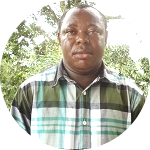Healthcare workers in West Africa are calling on their governments to prioritise their health and safety in the fight against the deadly Ebola virus.
Tens of medical workers in Guinea, Liberia and Sierra Leone have already died while trying to stop the spread of the virus across the region, including as many as 40 doctors and nurses in Sierra Leone alone.
Dr. Ayuba Wabba, chair of the West African Health Sector Unions’ Network (WAHSUN) cites the lack of protective gear in state-run Ebola treatment facilities as the main cause of the high infection and death rate amongst health workers, and says the need to address this shortcoming is critical.
“Healthcare workers are the first point of contact for an infected patient. Therefore the healthcare worker needs to be protected in order to give quality care to the patients,” Dr. Wabba said in an interview from Lagos, Nigeria.
“We have found out that the issue of safety of health workers over the years has not received the attention it deserves. And because the hemorrhagic fevers are viral infections which are highly contagious, it is very important for us now to deal with this issue.”
Over 1,200 people have contracted the virus in Guinea, Liberia and Sierra Leone resulting in 729 deaths [as of 1 August] since the first case was recorded in March this year, according to the World Health Organisation (WHO).
There is no vaccine or cure for Ebola, which can be fatal in up to 90 percent of cases.
The disease is characterised by fever, vomiting, diarrhoea and bleeding from areas such as the ears and eyes.
The recent death of Patrick Sawyer, a Liberian government employee who died from the virus in Lagos, set off fears that this highly infectious disease would spread across the Nigerian megacity, which has an estimated population of more than 20 million people.
Sierra Leone and Liberia — which have been worst-affected by the outbreak – have announced a state of emergency, closing all schools, imposing army-controlled quarantine zones and conducting house-to-house searches for infected people.
Deadliest outbreak
The current outbreak of the Ebola virus is the deadliest on record, in terms of the number of cases and deaths, as well as the geographical reach of the disease.
The WHO recently announced a US$100 million response plan to the Ebola crisis but in a region where healthcare facilities and funding was already strained, this outbreak is having a devastating impact on local communities – and healthcare workers.
Dr. Sheik Umar Khan, Sierra Leone’s only virologist who treated more than 100 Ebola patients, died from the virus on 29 July.
“Dr. Khan was an extremely determined and courageous doctor who cared deeply for his patients,” said MSF in a press statement.
Dr. Samuel Brisbane who was working in the John F. Kennedy Medical Centre in Liberia’s capital Monrovia, also died last week of Ebola.
About a month ago, a Uganda doctor Samuel Muhumuza Mutoro died of Ebola in the same health facility. A US doctor working for the aid organisation Samaritan Purse to combat Ebola in Liberia is currently infected with the virus.
“Guinea registered 20 deaths from 28 cases of health workers according to latest data from the Health ministry,” said Ougna Elise Camara, a journalist in Guinea’s capital Conakry monitoring the outbreak.
As well as protective materials, training on how to deal with Ebola is also an issue.
“A good number of nurses were not trained to handle such deadly disease which sometimes causes their death. And some of the personal protective gears are not good,” Alex Fatorma, regional secretary for the Sierra Leone Health Services Workers Union, told Equal Times.
“The recycling of protective gear is taking place and some hospitals do not even have the necessary gear in the first place,” he said.
But government officials say they are trying their best to protect healthcare workers.
“We try to sensitise all the health workers and also provide them with personal protective equipment that they must use at all times when caring for Ebola patients so that they don’t contract the disease,” Dr. Abubakar Fofanah, the deputy health minister told Equal Times.
But for Dr Wabba,more must be done.
“Healthcare workers must be given masks, gloves, protective clothing, chlorine, boots, and other things. The provision of adequate protective devices is part of our condition of service,” he said.









